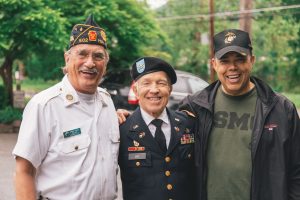 There are few experiences more isolating than transitioning from military to civilian life. This experience can be even tougher when transitioning to something as alien as academia. You can redouble that feeling of isolation once again now that these sane former service members are now actively social isolating creating something of an isolation within the preexisting isolating condition. This is the world our veterans now live in, one with unprecedented levels of isolation for an already at-risk population. Within the university system, veterans along with LGBTQ students are those who experience the greatest levels of isolation and ultimately have a much higher rate of completing suicide; we are now taking these populations and having increasing their isolation levels, making the risk of depression and other mental health concerns even more real. We all need to do a thorough job of checking in on each other, but we cannot always rely on other to check in on us, so we need to check in on ourselves.
There are few experiences more isolating than transitioning from military to civilian life. This experience can be even tougher when transitioning to something as alien as academia. You can redouble that feeling of isolation once again now that these sane former service members are now actively social isolating creating something of an isolation within the preexisting isolating condition. This is the world our veterans now live in, one with unprecedented levels of isolation for an already at-risk population. Within the university system, veterans along with LGBTQ students are those who experience the greatest levels of isolation and ultimately have a much higher rate of completing suicide; we are now taking these populations and having increasing their isolation levels, making the risk of depression and other mental health concerns even more real. We all need to do a thorough job of checking in on each other, but we cannot always rely on other to check in on us, so we need to check in on ourselves.
Now more than ever, the idea of self-care is more important than ever. I know that for many veterans, the idea of self-care comes off as froofy, hippy-dippy, or any other number of descriptors that degrade the idea of beneath them. I confess that I too have been guilty in the past of rolling my eyes at the idea of self-care, but age, wisdom, and several beatdowns from that great bully known as life have taught me that being deliberate about setting time aside for activities from which I derive pleasure have become paramount for my maintaining some measure of sanity.
 For me, jumping on my Harley and getting my fists in the wind can completely push the reset button on my metaphorical stress meter and make me feel like a whole new man. This is just one example of a self-care activity and I can scarcely think of a person who would refer to a bearded, tattooed man pulling back on the throttle of his iron horse as froofy or hippy-dippy. This is not to say that everyone should go out and by a Road King as their sole means of destressing (I’m also not explicitly stating that you shouldn’t), I’m just using my riding as a way to illustrate that self-care is not simply constrained to baths with aromatics, yoga, or mediation (all of which actually sound really nice to me, “froofy” or not). It’s all about doing something for yourself, by yourself, and leaving the trials and tribulations of life behind if only for a moment.
For me, jumping on my Harley and getting my fists in the wind can completely push the reset button on my metaphorical stress meter and make me feel like a whole new man. This is just one example of a self-care activity and I can scarcely think of a person who would refer to a bearded, tattooed man pulling back on the throttle of his iron horse as froofy or hippy-dippy. This is not to say that everyone should go out and by a Road King as their sole means of destressing (I’m also not explicitly stating that you shouldn’t), I’m just using my riding as a way to illustrate that self-care is not simply constrained to baths with aromatics, yoga, or mediation (all of which actually sound really nice to me, “froofy” or not). It’s all about doing something for yourself, by yourself, and leaving the trials and tribulations of life behind if only for a moment.
Exercise is also an incredibly powerful element of self-care which will aid you not only physically but mentally as well. And yes, I know that gyms are closed both on and off campus, but this does not give you an out. We all spent years training up on the push ups, sit ups, and two mile run (or something comparable for non-Army branches), none of which require gym access or any form of specialized equipment. Or if you’re sick of all that (not that I can blame you too much, I suppose) there are plenty of other ways to stay physically active. Go for a hike, so pull ups on your door frame, do dips using a chair, or get creative, there are always ways to stay active.
Stay safe, stay physically and mentally active, look out for each other, and as always myself and the rest of our Veteran Resource Center are here if you need anything, we’re just a phone call away if you need us.


